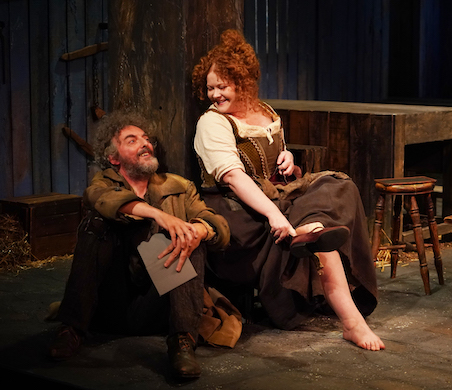Set in 1833, ‘Translations,’ Sadly, Feels Very Much in Sync With Our Times
Created by a great Irish playwright, Brian Friel, the play depicts a place in which heightened connection can seem to only foster more conflict between cultures and individuals.

Brian Friel once described his “Translations” as having “to do with language and only language” — a subject that the great Irish playwright mastered not only as a writer but as a thinker, an explorer of how we communicate or fail to do so. Offhand, I certainly cannot think of a play that confronts these matters more movingly than this 1980 piece, set in 1833 in a small community in County Donegal, where the townspeople, like millions in their country at the time, spoke primarily in Irish, or Gaelic.
“Translations” addresses language within a particular context, though, one in which other issues become just as relevant. The play unfolds amid the events leading up to Ireland’s Great Famine, as England was tightening its grip, sending in soldiers to devise a new map with anglicized names and introducing a National School System; by the end of the century, both the Irish population and the number of native speakers within it had been reduced dramatically.
In director Doug Hughes’s graceful, sinewy revival — the first of three productions to be featured in Irish Repertory Theatre’s “The Friel Project,” with “Aristocrats” and “Philadelphia, Here I Come!” due next year — “Translations” feels, sadly, very much in sync with the world as we know it today: a place in which heightened connection can seem to only foster more conflict between cultures and individuals.
The play unfolds in a barn-like setting, made authentically sparse and gritty in Charlie Corcoran’s scenic design that functions as a hedge school — one of the clandestine, makeshift institutions where Catholic youths and others seeking an alternative to the prescribed Anglican education could study, illegally. The first exchange occurs between a local girl whose severe speech defect has kept her mostly silent, Sarah, and a young man determined to help her overcome it, Manus.

Manus’s father, Hugh, is the learned but booze-addled schoolmaster, whose charges are mostly young but include the 60-something Jimmy Jack, a former prodigy who is fluent in Latin and Greek but plainly inept when it comes to taking care of himself. Their lesson is interrupted on this occasion by the return of Hugh’s other son, Owen, who after making good in Dublin has been hired by the British to, as he puts it, “translate the quaint, archaic tongue you people persist in speaking into the King’s good English.”
That soon emerges as a worse than thankless task, as the British captain and lieutenant who have accompanied Owen face aggressive resistance in the town. During an intermission between the second and third acts, sound designers Ryan Rumery and M. Florian Staab foreshadow the darkness to follow with the sounds of a rainstorm; the play ends with Hugh, portrayed with gravitas and beautifully understated melancholy by the venerable Seán McGinley, seeking solace in Virgil’s “Aeneid.”
The other actors — notable among them a young Broadway veteran, Seth Numrich, lending vigor and charisma to the role of Owen — are also superb. John Keating’s droll, lamentable Jimmy Jack is a standout, as is Erin Wilhelmi’s delicate but fervid Sarah, who can convey as much with tormented expressions and gestures as the others do in speaking.
Yet no words in “Translations” are more affecting than those uttered by the English lieutenant and a young Irish woman, respectively played by Mary Wiseman and Raffi Barsoumian, as they fall in love at the end of Act Two. Neither can understand the other’s language, but Friel — who writes primarily in English throughout, so that Gaelic is suggested more than it’s used — has both say, at different points, “I love the sound of your speech,” and, more meaningfully still, “Don’t stop — I know what you’re saying.”
The whole point of “Translations,” of course, is that communication is scarcely ever so simple. Friel finds great clarity and beauty in getting that across, and Mr. Hughes and his cast do those qualities full justice.
Correction: Hughes is the last name of the director. An incorrect name was included in one reference in an earlier version.

